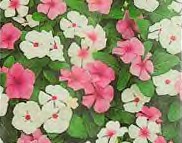






Annual
Vinca or Periwinkle is a prolific heat and drought tolerant annual, perfect for hot, dry areas. It's easy to grow, and requires little or no attention. A grower once reported that he has grown Vinca in the same location for 30 years. It successfully reseeded itself each year, with no effort on his part.
This plant is known by three names: Vinca, Periwinkle (or Madagascar Periwinkle), and Myrtle. Botanists will tell you that there is also a separate strain or variety of Periwinkle. Vinca plants are native to North America, Europe, China and India.
The plants are grown for its attractive glossy, green foliage, as well as its flowers. Flowers bloom all summer, and up to frost. Common colors include white, rose, pink, and red.
Vinca is commonly used for borders, edging, and ground cover or bedding plants. Plants grow 1-2 feet tall.
Medicinal Applications:
Over the years, Vinca has been used for medicinal purposes. Applications included:
Lowering blood pressure
Lowering sugar levels for diabetics
Treatment for coughs, colds, sore throats
Treating eye and lung infections
Plant Propagation:
Vinca or Periwinkle are grown from seeds. Sow Vinca seeds outdoors after all danger of frost. Many people will broadcast spread them across an area. These prolific, self seeders, will usually reseed themselves, if left unattended.
You can also start them indoors 10 to 12 weeks before the last frost in your area.
Some varieties can also be propagated by rooting cuttings.
How to Grow Vinca:
Vinca or Periwinkle will grow in range of light conditions, from full sun to shade. They will do well in average soils. They are both heat and drought tolerant. This makes Vinca ideal in hot, dry parts of the country where other flowers will wither and wilt.
Space Vinca plants 12-15 inches apart. Water well, when planting. Once plants are established, water only during extended droughts.
Add a general purpose fertilizer once or twice a season.
Mulch around plants in dry areas to help retain soil moisture.
Insect and Disease:
Vinca are seldom bothered by insects and disease. Fungus problems can occur in humid or wet weather. If insect or disease problems occur, treat early with organic or chemical insect repellents and fungicide.
Copyright © www.100flowers.win Botanic Garden All Rights Reserved